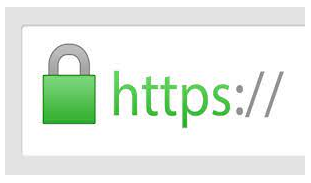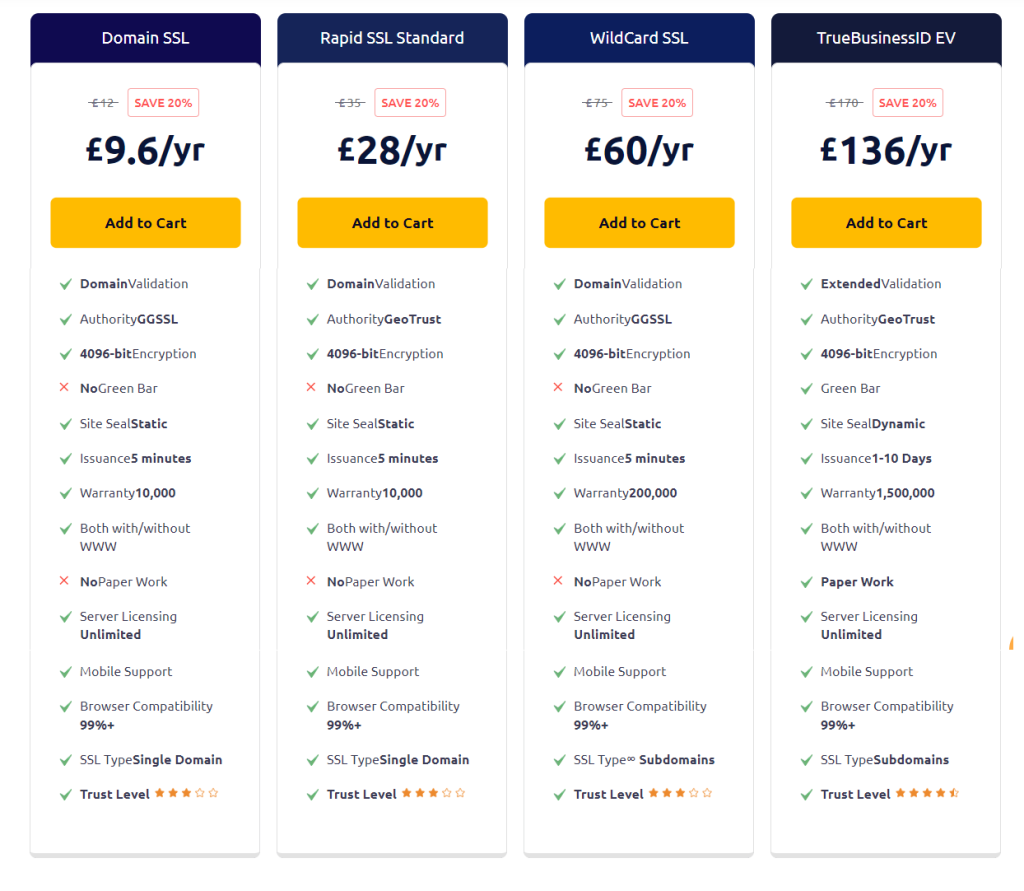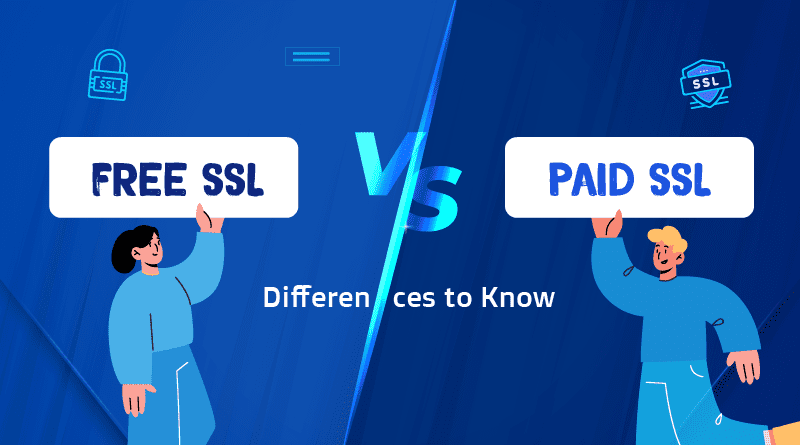Do you have a website? Then, security is a crucial thing you cannot ignore at any cost.
The Internet is a big world where you never know when your website gets hacked or becomes a cyberattack victim. Yet, the situation is quite alarming!
No matter; if you are a newbie, a blogger, or an e-store owner, you should shield your website with an SSL certificate. The whole and sole purpose of having an SSL is to create safe encryption between website visitors and web browsers.
I am pretty sure you might have heard about getting a free SSL with a web hosting plan.
However, do you know about paid SSL certificates that exceed the features you get with a free SSL?
Confused about which one to opt for? Here’s a blog that clarifies the difference between free and paid SSL certificates.
Before we move to the main point, let us briefly understand the SSL certificate.
Table of Content
What is SSL, and Why Do You Need One?
SSL is an encryption technology that protects sensitive information as it moves to and from the website. With an SSL certificate on your website, you can safely share sensitive information, including passwords, banking details, usernames and more.
You can recognize an SSL-secured website easily, as its URL begins with HTTPS rather than HTTP.

Securing a website with an SSL has now become a must-have!
More benefits to having an SSL:
- Builds trust among visitors
- Boosts your SEO rankings
- Improves your brand reputation
- The green padlock shows your website is super-safe
What is a free SSL certificate?
As the name indicates, free SSL certificates don’t require any payment, and website owners can utilize them plenty of times. These certificates are considered fast, easily available, and captivating to website owners since they help them increase their profits.
A free SSL certificate is available in 2 alternatives:
- Self-signed certificates
- SSL certificates signed by a Certificate Authority
Its degree of encryption is equivalent to that of paid SSL certificates. Both of these certificates offer 256-bit certificate encryption and 2048-bit key encryption. Let’s have a look at the things that you’ll receive when you opt to install a free SSL certificate on your website:
- Only Domain Validation SSL
As defined, a free SSL is only restricted to domain validation (DV), and it is perfect for small websites and blogs that don’t need to gather any financial data from their website visitors. These types of websites only need a fundamental level of authentication.
- Restricted Use
A free SSL certificate is perfect for basic websites and blogs, with no collection of visitors’ financial data, but it isn’t suitable for large business websites. On the other hand, dedicated website owners or entrepreneurs should opt for Organization Validated or Extended Validation certificates, alternatively, to validate their authenticity.
- Short Validity Duration
A simple free SSL certificate signed by a Certificate Authority (CA) is valid for 30 to 90 days and requires frequent renewal.
- Poor Technical Support
As this certificate is available free of charge, poor technical support will be provided when users encounter any issues. They’ve got to be reliant on forums where other free SSL certificate users get together to explain how to address SSL certificate-related problems.
- Uncertain Level of Trust
All SSL certificates aren’t the same. As open-source SSL certificate providers offer them free of charge, users do not get a guarantee that their information will be properly encrypted and protected. However, there were some cases in which free SSL certificates had serious cybersecurity problems in the past.
- Warranty
With free SSL certificates, you won’t get the warranty option. In the event that the website is attacked, the warranty money is the only final buffer for reconstructing the company website and the penalties that the government imposes for the data breach.
- SEO Ranking Factor
As per Google’s algorithm, websites with SSL certificates rank higher on the search engine result pages.
What is a paid SSL certificate?
A business or website owner can buy SSL certificates from Certificate Authorities (CAs) or licensed 3rd party resellers. A paid SSL certificate can come in various types, but Domain Validated (DV) SSL, Organization Validated (OV) SSL, and Extended Validation (EV) SSL are the most commonly purchased SSL certificate types.
– Domain Validated (DV) SSL
A domain-validated SSL certificate has the most basic level of validation in comparison with others because it is only validated against a domain registry. This type of certificate adds the “S” in the HTTPS connection and the certificate authority doesn’t need a strenuous process of checking to purchase it. It supports almost 99.99% of websites and smartphone browsers.
– Organization Validated (OV) SSL
These paid SSL certificates support the X.509 RFC standards, which present all crucial information needed to validate an organization. The certificate authority authorizes the identity of the respective organization before issuing the certificate, which might need a couple of days of verification.
– Extended Validation (EV) SSL
The certificate authority carries out rigorous validation for this type of certificate. Certified service agents authorize the organization’s identity with the help of the organization’s registry databases that are hosted by the government.
The paid SSL certificates provide the following benefits:
- Range of Choices
Paid SSL certificates are perfect for eCommerce websites, social media websites, and customer acquisition websites. These types of websites collect confidential data from their website visitors.
Besides above mentioned 3 most popular SSL types, users can also buy wildcard, single domain, and multi-domain SSL certificates that provide website security.
- Degree of Validation
Certificate authorities carry out rigorous validation processes to ensure that paid SSL certificates, like OV and EV, are assigned to legitimate websites or business owners.
- Prolonged Validity Period
The validity of paid SSL certificates is up to 27 months and should be renewed after each validity period to ensure that their elements are up to date and per industry standards.
- Customer Support
The money invested in a paid SSL certificate is accompanied by outstanding customer support from their certificate authorities. To assist the users all through their certificate’s life cycle, they’ve got a dedicated team of qualified technical professionals who can be contacted via email, chat, or call.
- Degree of trust
As mentioned above, paid SSL certificates are available in different types like DV, OV, EV, and so on. Based on the degree of trust, these SSL certificates can showcase the name of the organization, country, city, and state.
Additionally, visitors to the website can also see the certificate authority who issued the respective certificate. If the website visitors are still skeptical, they might visit the CA/B Forum’s list of members for more details. The CA/B (Certificate Authority/Browser) Forum is a non-governmental group of certificate authorities, i.e., CAs, internet browser vendors, and suppliers of different applications that utilize X.
To prove the legitimacy of the website, users can check another visual indicator, i.e., “https” and the green bar seen on the search bar when accessing the website.
- Warranty
Depending on the degree of encryption that certificate authorities promise, users can hope to receive complete security from data breaches. Despite that, if a data breach occurs, the user is covered and can be granted an amount of $10,000 to $1.5 million, based on the type of paid SSL certificate they own. It is the amount of money that the user lost from the given data breach incident, i.e., the payment for damages.
SEO Ranking Factor – Paid SSL certificates can improve the SEO ranking of websites on Google.
Knowing the Differences Between Free SSL and Paid SSL
– Sourcing and Validating SSL Certificates
The topmost advantage of obtaining a free SSL certificate for your website is that it is easy to install on your website and it provides comprehensive website security. For the first year, it is free, but from the next year, you’re required to pay the renewal charges.
These certificates normally validate just the domain ownership, without validating the website or business’ identity. Thus offering minimum surety to the users.
Paid SSL certificates offer a top level of validation compared to free SSL. Concerning paid certificates, the CAs (certificate authorities) perform thorough checks in order to verify the identity and legitimacy of website owners. This in turn makes users more assured that their website is more reliable.
– The Validity Factor
Generally, free SSL certificates, like Let’s Encrypt are valid for 30 or 90 days. If you go with the free SSL certificates, you need to renew them immediately after 90 days.
It becomes a hectic task. On the other hand, when it comes to Paid SSLs, they are valid for 1 or 2 years.
Thus, you don’t have to go into the hectic renewal process now and then! The best part is whenever your SSL is about to expire, you will receive reminder emails regarding the renewals.
– Support
What if you get into a security issue? You need someone to deal with the issue, right? With a free SSL certificate, you do not get any support from the providers.
In this scenario, you have to go through the old forums. Whereas with paid SSL, you get complete support from the Certificate Authority.
– Customer Trust
The most vital factor that keeps a business going is the customers’ trust! They might not trust you because you don’t offer an SSL certificate issued by a reputable Certificate Authority. It ultimately affects your brand’s reputation and your business.
Alternatively, SSL certificates come with a trust seal which you can place on your website to boost your visitors’ confidence. Free SSL does not come with such types of site seals.
– Types of SSL Certificates
There are different types of SSL certificates, which vary based on the validation they offer.
Free SSL certificate comes with Domain Validation (DV) option. They offer nothing but a basic level of authentication for websites.
This platform is ideal for blogs and small websites. Instead, Paid SSL certificates come in three options, Organization Validation (OV) and Extended Validation (EV). Each of these offers the highest level of security and is apt for big businesses and e-commerce sites.
– Warranty Matters
Last but most important, warranty matters a lot! With the free SSL certificate, you are not covered by any warranty if anything goes wrong.
Speaking about the Paid SSL certificate, there is a warranty assured! You have nothing to worry about if any issue occurs with the certificate or fraudulent transactions.
– Compatibility with Servers
Paid SSL certificates work best with the most popular servers like Apache, cPanel, dedicated, VPS, or any you require.
Compared with free SSLs, they are less compatible and limited to a few servers.
Free Vs Paid SSL: Which One to Go With?
| Parameter | Free SSL | Paid SSL |
| Compatibility with all servers | ✖ | ✓ |
| Validation levels | ✖ | ✓ |
| Green lock in the web address bar | ✓ | ✓ |
| Trust seal | ✖ | ✓ |
| Warranty | ✖ | ✓ |
| Support | ✖ | ✓ |
From the above table, you might have got things more clear. So, does it mean investing in a paid SSL when free ones are available?
A free SSL might not be the right fit for every website. You cannot have the features and functionalities of paid SSL in a free one.
In the end, the answer depends on the type of website you have and to what extent you care about security.
Related: Let’s Encrypt Free SSL/TLS Certificates Available At MilesWeb
Start Securing Your Site Now
At MilesWeb, security is always at the top of our priority list. We offer high-assurance SSL certificates from renowned providers. Head over to our paid SSL plans.

No more concerns regarding security issues. Start growing your business with confidence!
In short, a free SSL certificate might be a tempting option for a new website, but it might not serve the desired purpose of securing your website. They can potentially limit your website’s performance to minimal conditions, which is most undesirable. That is why using paid SSL certificates gives a higher level of security to all types of websites irrespective of their size.
Rest assured that certificate authorities have your intent for the website in mind and will accompany you through the process.
FAQs
1. What do you mean by SSL and why is it important for your websites?
SSL is an encryption technology that protects sensitive information as it moves to and from the website. With an SSL certificate on your website, you can safely share sensitive information, including passwords, banking details, usernames, and more.
2. What is the key difference between free and paid SSL certificates?
Paid SSL certificates offer enhanced encryption levels compared to free SSL certificates.
3. Free SSL vs. paid: which one is more secure?
To a large extent, there are no huge disparities between the two as per the level of encryption. The level of security depends on the type of encryption offered.
4. Is it possible to use a free SSL certificate for eCommerce websites?
Free SSL certificates are perfect for basic websites and blogs.
5. What are the advantages of free vs. paid SSL?
Free SSL doesn’t provide any warranty against data breaches or any other type of malicious attack. On the contrary, paid SSL certificates commit to paying a predetermined warranty amount to the website owner in the event of a data breach, or loss of money because of suspicious transactions.








